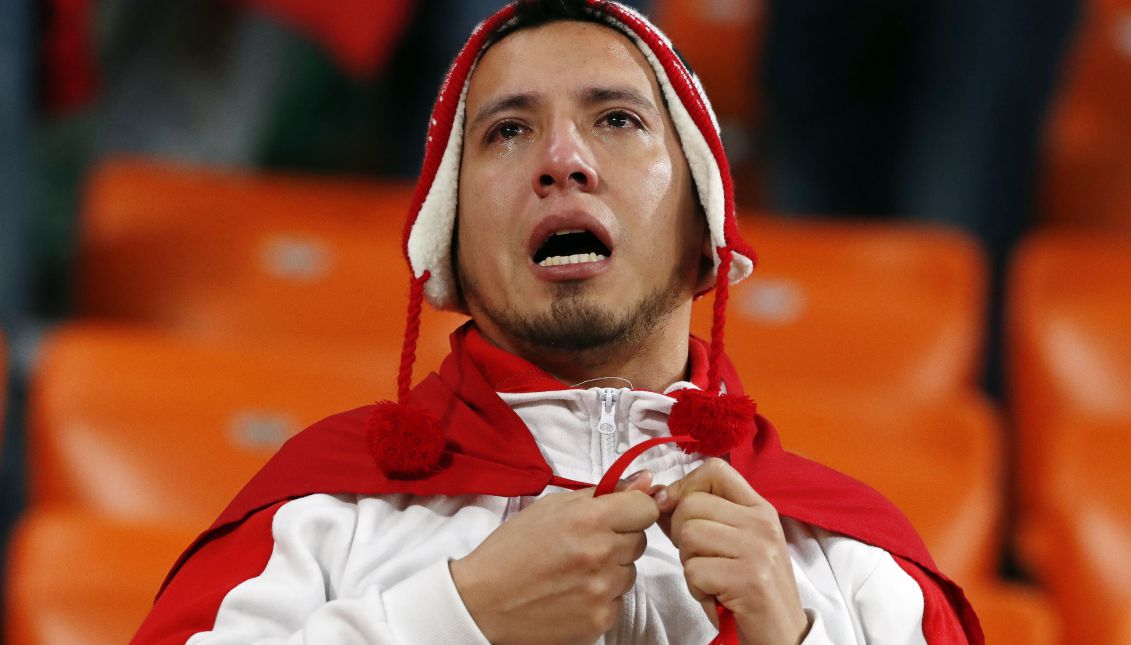
Russia 2018: Reporting on the World Cup in Quechua
Peruvian radio reporter Luis Soto has spent almost ten years collecting football vocabulary in Quechua, the mother tongue of thousands of Peruvians of…
Thursday was not a good day for the Peruvian soccer team, which had not qualified for a World Cup since 1982. After an intense game held at the Ekaterinburg stadium, France eliminated Peru by 1:0, ending their odyssey at the 2018 World Cup.
Hundreds of Peruvian fans showed their disenchantment, either from the stands of the stadium, where more than one fan was seen crying, or at home in front of their televisions, or with their ears glued to a radio, most of which vibrated with the comments made by sports commentators of their country, where Spanish is the most spoken language.
But those who followed the match on the radio from Cuzco, an Andean city famous for being the base of excursions to Machu Pichu, were fortunate to follow the broadcast of the game in their native language, Quechua, thanks to the efforts of Luis Soto. This 44-year-old radio broadcaster from Cuzco has spent the last ten years preparing to report on World Cup matches in the language of the ancient Incas, as reported this week in The New York Times.
Since the World Cup began on June 14, Soto has been narrating the football matches in Quechua on Radio Inti Raymi, a radio station located near Cusco.
To do so, he had to adapt with dozens of words that do not exist in the indigenous language, starting with the word soccer ball, which became "qara q'ompo," which means leather ball or sphere, as reported in Times. The word "Goal - "gol", however, has the same meaning in Quechua and in Spanish.
According to El Espectador, the idea of narrating soccer in Quechua arose when Cienciano, Cusco's local team, beat River Plate of Argentina in 2003, winning the Copa Sudamericana. A year later Soto began to report on a match of the national team in Quechua for the first time and, since then, he has been adding words and phrases to his dictionary, by asking the locals what football expressions they would use.
For now, his football dictionary already has more than 500 words.
RELATED CONTENT
Spanish is the most spoken language in Peru, a country of 37.7 million inhabitants, but in recent years the country is making efforts to revitalize Quechua, a historically marginalized language, in order to put an end to racism and discrimination against the indigenous people that live in the Andes, which represent around a fifth of the population.
"Some statistics suggest that 60% of the people in Cusco speak Quechua, but people don’t necessarily want to speak the language... There’s been a legacy, a colonial legacy… And Peru has created social hierarchies that disadvantage those who are indigenous or live certain lifestyles, have certain physical features, wear certain clothing, or speak a certain language. Quechua has been an aspect to discrimination," Professor Americo Mendoza-Mori, founder of the Quechua Language and Andean Culture program for the University of Pennsylvania, said in a recent interview with AL DÍA News.
"Many U.S. Latinos, usually second or third generation, do not know how to speak Spanish - and, much less an indigenous language or dialect from where they originate. That lack tends to come from this stigma of retaining your home language", said Mendoza-Mari. Like in his native Peru, where everybody embraces Spanish, in the U.S. Latinos felt that they had to give that up to “join the masses,” that speaking English was integral to what it “meant” to be an American.
"Many of these U.S. Latinos are interested in going back to their linguistic roots and creating a new narrative for themselves, but they may have that barrier of language or may feel intimidated by learning the languages and dialects from their homeland," he added.
Part of the Quechua program, in a wider sense, is to get people to re-think about what it means to be an American through celebrating and encouraging minority cultures and languages of the Americas.
Two players from the Peruvian national team, Renato Tapia and Edison Flores, recognize themselves as "Afro-Peruvian and indigenous" and have collaborated with the Peruvian government to promote respect for the indigenous population.











LEAVE A COMMENT: